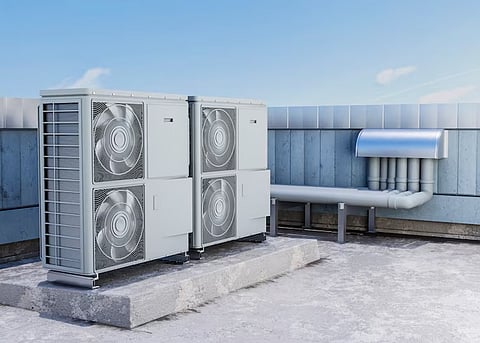How to Reduce Noise from Commercial HVAC Units
A noisy commercial HVAC system can hinder client perceptions of the facility, lower productivity, and make employees unhappy. The good news is that there are a variety of HVAC noise reduction measures to take into account. Business executives and other specialists can solve noisy HVAC systems and prevent them from generating serious issues over time. Click here for details about the best solutions for reducing noise in commercial HVAC units, and also to understand the underlying cause of these noises.
Why HVAC Noise Matters in Commercial Spaces
For various reasons, such as interpersonal relationships, adherence to laws, and health consequences, it is essential to realize how to reduce HVAC noise in commercial settings.
a) Health Implications
Lengthy loud noises lead to hearing problems. Besides, loud noises also escalate stress levels, thus upsetting a person's overall well-being and causing long-lasting problems such as anxiety and high blood pressure.
b) Productivity Effects
Loud HVAC units significantly affect a workplace's efficiency. Unnecessary loud noises make it challenging for staff to adhere to given commands or cautions, impairing communication and possibly contributing to safety threats.
c) Legal and Regulatory Compliance
Ignoring the problem of noise pollution might have significant legal repercussions. Law officials may enforce fines for infringement of local noise rules. Furthermore, due to loud noises, firms may be sued by impacted parties, thus resulting in legal disputes and harm to the business's credibility.
Understanding The Sources of HVAC Noise
According to Forbes, an HVAC unit may start to make more noise for several reasons. Structural wear and tear is one leading cause of HVAC noises. As HVAC systems age, parts such as belts, fans, and bearings may wear out and become noisier. Also, poorly installed HVAC units cause system imbalances, leading to these noises.
Airflow blocks are one more key driver of HVAC noises. When the filters get blocked, vents closed, or ducts clogged, the HVAC unit is forced to run at high speeds, thus producing more noise. Lastly, the age of an HVAC system is another noteworthy factor causing unnecessary noises. Old HVAC units do not run as quietly as the newer models, even when you conduct regular servicing.
Practical Solutions to Quiet Your HVAC System
Here are some practical HVAC noise solutions that can help you reduce HVAC noise issues;
1. Performing Maintenance Checks
It is essential to conduct maintenance checks in your HVAC system to make sure that all its components are working as needed. This can help in ending any noise issue. Always inspect the sieves, belts, and other motorized parts that require regular checking.
2. Tackling Ductwork Problems
Addressing ductwork problems aids in HVAC noise reduction and minimizes energy consumption rates. Seeking duct testing services can also assist in locating specific issues that may require immediate attention.
3. Implementing Sound Reduction Strategies
Sound-proof materials may be a helpful remedy when noise issues worsen due to your HVAC system's positioning. In addition, to offer natural sound insulation for outside units, consider using landscape obstacles like shrubs or trees.
4. Considering a VRF System
Variable refrigerant flow (VRF) systems are suitable for corporates targeting to attain energy efficiency and operate in quiet atmospheres. These systems provide precise control and run at lower noise levels than outmoded HVAC systems.
The Role of Maintenance in Noise Reduction
The New York Times states that establishing a calm and cozy setting requires regular maintenance and noise monitoring. Frequent monitoring aids in recognizing the cause of the noise, whereas maintenance checks assist in ensuring that the HVAC system runs efficiently. Besides, always carry out frequent inspections to recognize and quickly address any HVAC noise issue.
When To Call in The Experts for Noise Issues
HVAC units experience mechanical issues over time. Though the users can handle some minor issues, there are others that require the proficiency of an expert HVAC service provider.
Below are the vital signs that point to it being the right time to call in an expert to address your HVAC noise problems;
Uncommon sounds from your HVAC unit
Varying temperatures in your home
Increased energy bills
Deprived air quality and disproportionate dust buildup
If the HVAC unit is frequently turning on and off
Thermostat malfunctions and refrigerant leaks
In Conclusion
By being cognizant of your HVAC system's noises, you can spot faults early on and avoid more serious, expensive problems. Nevertheless, as there are numerous potential causes of HVAC noises, it can be challenging to address the issues based on noises only. Contact Fusion Repair whenever you notice any strange noises in your HVAC unit. Our skilled team is devoted to assisting our clients in recognizing and resolving any HVAC noise issue, making sure that an HVAC system works efficiently as needed.
Inspired by what you read?
Get more stories like this—plus exclusive guides and resident recommendations—delivered to your inbox. Subscribe to our exclusive newsletter
Resident may include affiliate links or sponsored content in our features. These partnerships support our publication and allow us to continue sharing stories and recommendations with our readers.

